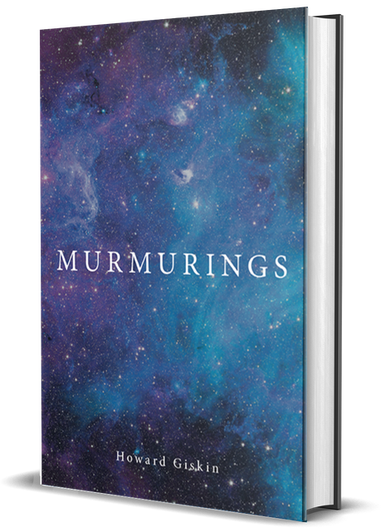About the BookLiving was not lost on us for the island’s millennia spoke, its nooks and crags murmuring … There are stories being whispered around us, if we but listen. Murmurings is a collection of poetry that draws upon the experiences of a lifetime spent traveling the world, reflecting on philosophy and the spirit, and listening deeply. The poems express singular moments in time—Walt Whitman strolling in Prospect Park, mulling over a line of poetry; Monet gazing upon swirls of water lilies with eyes made fuzzy by cataracts; an ancient nun, smiling and chanting through smoky drifts of incense. Rich in details, Murmurings will draw you in, fill your senses, and let you imagine yourself in another place … in another time. |
If you would like to receive a free digital copy of Murmurings, please contact Howard!
Reviews
From Foreword Clarion Reviews
Howard Giskin’s Murmurings is a hauntingly beautiful compilation. It includes poems, musings on the author’s past, thoughts on ancient history, evocative pictures from Giskin’s travels, and daily observations. Giskin’s writing is intelligent, and his poems have a natural flow and cadence. Murmurings is a joy to explore, putting into poetic form the art of observation.
The book is divided into sections based on the pieces’ inspiration. One section is like a multigenerational memoir, focusing on the author’s childhood, family members, deceased grandparents, and ancestors. Other sections include observations on life in big cities and the characters who live there; views on art and other poets, philosophers, and artists; and treatments of history. The book plays with different cadences, and its poems are engaging as result of their variety.
The use of metaphors in Giskin’s poetry is abundant, yielding poems that are well rounded and intrinsically beautiful. Spacing and verse shapes, as well as varying typographies, are explored, impacting how the poems are read and what feelings they conjure. Themes of death and uncertainty are meaningfully approached, evoking complex emotions and juxtaposing sorrow and beauty.
Imagery is descriptive and complex. Verbiage is intelligent but without pretension. Poems come in an appropriate free-verse style. Chapters are aptly divided and, along with their poetry, each includes artistic photography. Such images are engaging, if ultimately not necessary for achieving the understanding that Giskin’s lines impart so well on their own.
This work is a celebration of words and their powerful combinations. In its turns, it functions as a ode to sounds and meaning. Experimentation, even when describing something mundane, makes the text’s moments significant and exceptional. This is a collection whose works are healing, like medicine for life’s pains.
Observations from Giskin’s travels cover different cultures, customs, and people; these insights are fascinating, intuitive, and inquisitive. The work is beautifully observant and generates curiosity in an engaging way. Lines find charm even in the ugly. Musings on individual fragility and on major life questions are introspective and intriguing.
Written with clarity, experimentation, and obvious joy, Murmurings is inspirational, full of tiny flashes of simple beauty. Sorrow and delight coexist in perfect harmony in this stunning collection, wherein Giskin makes meaning from the simplest moments of daily life.
Reviewed by Katie Asher , January 13, 2018
From Kirkus Reviews
A collection of poems touches on memory, time, and place.
A retired specialist in world literature, Giskin delivers poetry that concentrates on small, impactful moments scattered across various corners of the world. Many of the sections in the collection reflect the loose sense of geography and wandering that tie the poems together, including "The City," "Distant Skies," and "Qin." But even as he moves from China to "glacial valleys and small villages" in Europe, Giskin maintains a stillness in his pieces, centering them on specific memories and the sensory experiences they evoke. The millennia of history on a Greek island become a "goose-down quilt / in a / spacious house," and a cabin from his childhood is "quietly resting / at the bottom / yet has the flavor / of wetleaves / chimney smoke / pancakes and love." The poet also subtly explores failing memory to properly re-create moments; his apartment in New York City had an elevator he "cannot recall," and to him, the most interesting gravestones at St. Paul's Chapel are those that are blank, "washed clean by seasons of rain and cold." Giskin connects this fleeting nature of memory to the immigrant experience, both through a grandmother who "could neither read nor write, / left Poland never again to see" and his own travels abroad, taking him to the Temple of Diana in Nîmes, France; the pyramids of Giza; and an earthquake in Greece....
Elegant, subdued poems that offer a calm reflection on memory.

